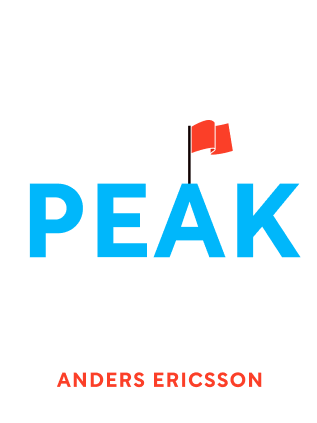

This article is an excerpt from the Shortform book guide to "Peak" by Anders Ericsson. Shortform has the world's best summaries and analyses of books you should be reading.
Like this article? Sign up for a free trial here .
What is deliberate practice? Is there such a thing as innate talent or is talent a product of deliberate practice?
Deliberate practice is about building your potential and making possible what was once impossible. So, what is deliberate practice, exactly? It is a slow, iterative process that involves precise measurement, competition, templates, coaches, and extreme effort. There are no big leaps or breakthroughs, just hard work.
Continue on to learn more about “what is deliberate practice,” and how you can use deliberate practice methods to improve any skill.
What Is Deliberate Practice?
Truly effective practice goes a step beyond purposeful practice, to deliberate practice. Working hard and pushing yourself beyond your comfort zone, by themselves, are not enough. Deliberate practice builds on the principles of purposeful practice, but it applies them in a systematic, rigorous framework that leads to the level of performance we see from experts. What is deliberate practice? Unlike purposeful practice, deliberate practice isn’t about fulfilling your potential—it’s about building it, making possible what was once impossible.
With this type of practice, you are working with highly developed and well-accepted training methods that have been proven effective in getting results. These methods have been honed and perfected by those who came before you into a near-science. With purposeful practice, if you push yourself, you might see improvement. With deliberate practice, you’ll become an expert. There are a few key features of deliberate practice.
So, what is deliberate practice? It is defined by five characteristics that separate it from purposeful practice.
- Deliberate practice can be measured precisely. Whether it’s a win/loss record in chess or your finish times in a sprint, there are objective ways for you to evaluate your performance. It is informed and guided by the past achievements of great performers in a given field and an understanding of what exactly it is these individuals did that made them great. There are defined standards of excellence with deliberate practice—a mental representation of what ultimate success looks like.
- Deliberate practice is competitive. This provides aspiring experts with a motivation to keep practicing and improving. You want to be the best in your field.
- Deliberate practice is time-tested. You’re not trying to do something that no one else has ever done before. Instead, you’re operating in a field where best practices have been developed over a long period of time—even centuries. You’re following the template that experts before you have followed successfully, using skills that have been developed over a long period of time. This gives these fields a large body of past work to which current students can look for reference.
- Deliberate practicing is done under the tutelage of teachers and coaches. With deliberate practice, you’re working in a field whose high level of development and venerable history of best practices have produced a highly skilled and sophisticated cadre of professional mentors who can guide you every step along your path to expertise. You’re working within a practice regimen designed by a coach, with lesson plans drawn from training techniques that have proven to be effective over the long history of the field in which you’re working.
- This type of practice demands rigorous training and maximal effort, which is often unpleasant. Like purposeful practice, it is precise and targeted: you’re working to master a specific skill, not achieve some vague general “improvement.” This is why effective deliberate practice usually rests on a foundation of existing skill sets: you’re applying deliberate practice to an area where you already have some foundational knowledge or skill.
Thus, for deliberate practice to be effective, it’s best to employ it in the right field. Some pursuits, like playing in a rock band, are too subjective. There’s no clear definition of what constitutes a “good” or “great” band. There’s no clear-cut way to measure performance.
It’s also a slow, iterative process. Contrary to popular belief, there are no big leaps or breakthroughs. It’s grinding and painstaking, with progress being made in a series of little steps. What looks to an observer like a sudden leap forward is actually the last in a series of baby steps.
Critically, it depends on effective mental representations, which show you how to do your task properly and correct yourself when you make mistakes. And, as we’ve seen, mental representations and improved performance form a virtuous circle: the better you get, the more fleshed-out and detailed your mental representations will be, which, in turn, gives you the tools to improve even more.
Innate Talent or Effort?
Anders Ericsson, author of Peak, studied the development of musical ability in violinists at the Berlin University of the Arts. He and his team of researchers grouped the students into three categories of ability: broadly speaking, they were “best,” “better,” and “good.” The purpose of the experiment was to try to understand what separated the outstanding musicians from those who were simply “good.” What is deliberate practice versus innate talent? Is there even such thing as innate talent?
Given the extreme difficulty of playing the violin, it requires a great deal of solitary practice time to master the instrument. It is crucial to practice outside of scheduled sessions with one’s teacher. The students were honest with the researchers: the intensive solo practice sessions weren’t fun. It would have been much more pleasurable devoting that time to something else. But they saw practice as being crucial to their development as musicians, so they kept at it.
The researchers found that the only major difference among the three groups was how much time they devoted to solitary, deliberate practicing. They calculated that the “good” students would practice an average of 3,420 hours on the violin by the time they turned 18; the “better” students would practice an average of 5,301 hours; and the “best” students would practice an average of 7,410 hours.
There were no shortcuts to becoming an excellent violinist. All of the top achievers had devoted several thousand hours of practice to the instrument: none of them were “prodigies” who simply surpassed their peers without putting in any practice. The quality of practice was also crucial: the students were not merely repeating the same exercises over and over in their practice sessions. Instead, they were employing the principles of deliberate practice—precise goals, competitive focus, and operating within a time-tested training regimen based on the best practices of centuries of accumulated knowledge in the field. They know the answer to the question, “what is deliberate practice?” and so can you.

———End of Preview———
Like what you just read? Read the rest of the world's best book summary and analysis of Anders Ericsson's "Peak" at Shortform .
Here's what you'll find in our full Peak summary :
- How to become an expert in any field you choose
- Why practice isn't enough because you need to change how you practice
- Why natural talent isn't enough and practice is more important






